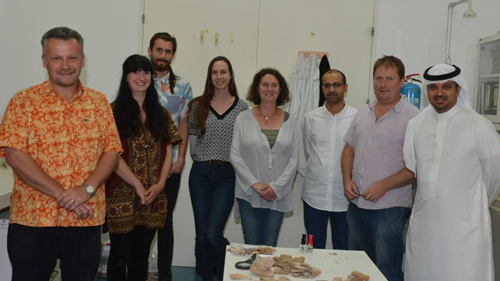Contact Center
.
21 November 2017
End of Archeological Excavations Works in Muharraq & Bilad- al Qadeem, The British archaeological team unveils precious historical information

Professor Timothy Insoll , the Head of the British Archaeological Expedition, and an archaeologist and Al-Qasimi Professor of African and Islamic archaeology at the Institute of Arab and Islamic Studies at Exeter University, UK, revealed the results of his team’s research during their excavations works undertaken in Bahrain since 5 Nov 2017. The team found precious historical information during the three weeks of archaeological study and meticulous search, with regard to new discoveries supporting the theory of thriving Islamic period civilization in Bahrain.
The results of the archaeological excavations done near Al-Qaysariya Suq, al Muhrraq and Pearl Trail, revealed the existence of remain of pottery and other artefacts dating back to the Umayyad era. This suggests that Muharraq might have been the capital of Islamic world before moving to Bilad al-Qadeem and Qala’at al –Bahrain.
Although an early Centre of Islam, until recently and discoveries on Muharraq, the archaeology of the Umayyad period has remained elusive on Bahrain. This material will be considered and the lecture will review the Islamic archaeology of Bahrain from the Umayyads through to the Omanis in the 18th century CE. On Awal, definitive Umayyad evidence is still absent, with Abbasid material representing the earliest phases of Islamic archaeology at, for example, the important sites of A’ali, Barbar, and in the surroundings to the Al-Khamis Mosque and at the Al-Hassan Mosque mound in Bilad al-Qadim. The chronology of the Al-Khamis Mosque will also be examined and contextualized in relation to mosque architecture elsewhere in Bahrain and the wider Gulf region. The Islamic settlement and shore fort at Qala’at al-Bahrain, and the tell at Barbar will then be presented, to evaluate what can be inferred about a possible shift in Islamic settlement to the northwest of Awal, and a locus of occupation that continued into the Omani period. Finally, recent research on the pre- 20th century Islamic funerary inscriptions of Bahrain were also be introduced.
Both Professor Timothy Insoll and Dr. Robert Carter, University College London, who is taking part in these archaeological works, have pointed out that the unearthed artifacts and pottery jars were manufactured and made in different locations and countries, ranging from India, to Iran and Iraq. Special artifacts were discovered also dating back to Fatimides era in Egypt, which suggests the important role played by Bahrain as an international commercial crucial hub at the crossroads of East and West since ancient times.
Worth to mention that Bahrain Authority for Culture & Antiquities (BACA) is working with the British Archaeological Expedition to enrich and support the historical information and list of archaeological discoveries that relate to the Islamic period in Bahrain.







